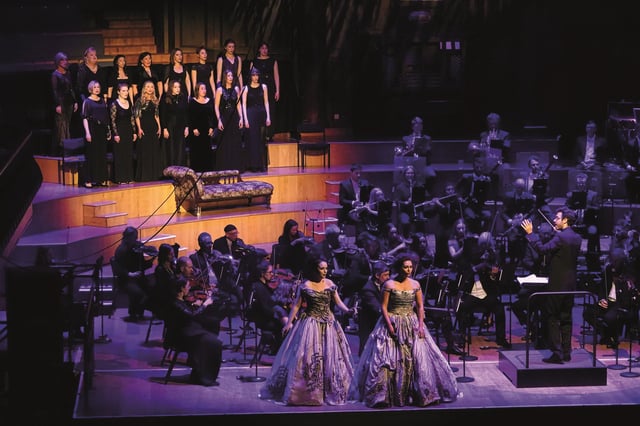Islamist terrorists ADF behead 70 people in church in Democratic Republic of Congo, says MP Carla Lockhart and Open Doors
IN PHOTOS: Jeffrey Donaldson’s daughter marries son of UUP chair Danny Kennedy
Did you know with a Digital Subscription to Belfast News Letter, you can get unlimited access to the website including our premium content, as well as benefiting from fewer ads, loyalty rewards and much more.
The first half concentrated on the Strauss “Metamorphosen-Study for 23 Solo Strings”.
Under the direction of the conductor Christoph Altstaedt, the players gave a moving performance of this work which began in quiet solemnity and then seemed to reflect some light towards the end, but finished again on a solemn note.
Advertisement
Advertisement
The context of the piece is important. It was written by Strauss following the Allied bombing of the Munich National Theatre in 1943 and the destruction of the Vienna Staatsoper two years later.
This composition by Strauss was his mourning for a world embroiled in war, and yet the score is as relevant today as it was in 1945 when it was written.
Today’s world is no less frightening than it was some 80 years ago.
The second half was devoted to the Haydn masterpiece “The Seven Last Words of Christ”, in the version which had its premiere in Vienna in 1796. Joseph Haydn was a devout Catholic who apparently wore his best clothes when he was composing because he believed that he was receiving Divine inspiration.
Advertisement
Advertisement
In a recent BBC Radio 3 profile presented by the actor David Suchet, the point was made that in this work Haydn revealed his very heart and soul, so it is not surprising that the composer himself regarded this as his best artistic achievement.
The piece was originally intended for musical instruments only but Haydn created a Choral Version with an amended text by Gottfried van Sweiten from the orginal by Joseph Friebert.
The Ulster Orchestra was joined by the Northern Ireland Opera Chorus and soloists Mary McCabe (Soprano),Jenny Bourke (Mezzo Soprano), Euan McDonald (Tenor) and Seamus Brady (Baritone) – all of whom gave an assured and impressive collective performance under the steady direction of Christoph Altstaedt on his welcome return to Belfast.
This was an entirely appropriate concert for the evening of Good Friday.
Advertisement
Advertisement
The next concert on May 2 sees the return also of the Orchestra’s highly-regarded former Chief Conductor Daniele Rustioni.
The programme will also feature the outstanding pianist Angela Hewitt as the soloist in Mozart’s Piano Concerto No24, so the concert in the Ulster Hall starting at 7.45pm looks like being a sell- out.
Did you know with a Digital Subscription to Belfast News Letter, you can get unlimited access to the website including our premium content, as well as benefiting from fewer ads, loyalty rewards and much more.
Did you know with a Digital Subscription to Belfast News Letter, you can get unlimited access to the website including our premium content, as well as benefiting from fewer ads, loyalty rewards and much more.
Ulster Orchestra features the music of Richard Strauss and Joseph Haydn in an evening of music for reflection at the heart of Easter – Belfast News Letter
